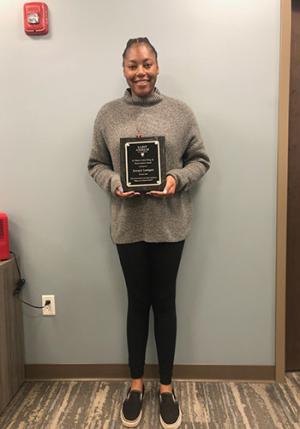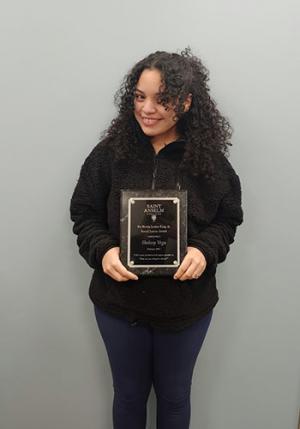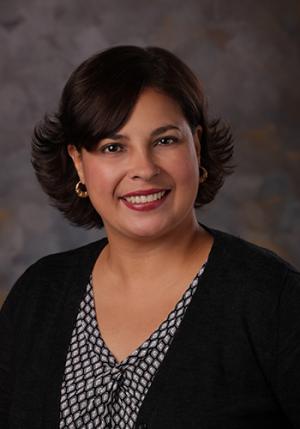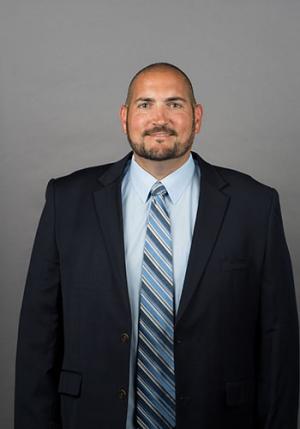On Tuesday, Feb. 2, 2021, as a part of its month-long programming, Saint Anselm College celebrated the 10th Annual Martin Luther King Jr. Dinner. Like so many events held since last March, the dinner, sponsored by the Center for Intercultural Learning and Inclusion, Campus Ministry, and the Multicultural Student Coalition, was different this year. Instead of gathering together for a meal in the New Hampshire Institute of Politics (NHIOP), event attendees logged onto Zoom to come together virtually. Yet despite the social distance, the commitment to honor Dr. King’s call for unity, social justice, and racial equality remained unchanged.
Karina Hernandez ’21 introduced the event’s theme, “Language of the Unheard,” which recognized the trauma of the past year while honoring that on campus, “we are many voices, we are one community.”
Many voices shared words of power and hope throughout the night, beginning with a blessing from Fr. Stephen Lawson ’08, O.S.B., who read a prayer from Dr. King. Korah Oliver ’22 shared an excerpt from the book “Holy Ground” by Chris Castaldo, followed by junior Chance Clency’s reading of Dr. King’s speech “The Other America.” Senior Jackson Heath ’21 presented his original poem, “The Capital D on January Sixth,” followed by first-year Jillian Barrett’s reading of “Still They March.”
Senior Jennifer Diaz Salvador ’21 (Sociology and Peace & Justice) reflected on her time at Saint Anselm and the impact of the Center for Intercultural Learning and Inclusion. Although she initially felt like she didn’t belong on campus, when she got involved with the center, she found confidence and her calling: to fight against social injustice.
Following Diaz Salvador’s reflection, Wayne Currie, director of the Center for Intercultural Learning and Inclusion, introduced the event’s Social Justice Awards segment. Each year, the award is bestowed on a student and a staff member who inspire others to lead with compassion and courage, and who reflect Dr. King’s overarching message of eliminating discrimination, oppression, and injustice. This year, given the many compelling nominees, the awards Committee chose to honor two students and two staff.

Jenoyce Laniyan ’21 (Politics) and Shelsey Vega ’21 (Natural Sciences) received the student Social Justice Awards. Assistant Women’s Basketball Coach Colleen Moriarty presented the award to Laniyan, describing her as a student-athlete who has “demonstrated tremendous passion and courage in promoting social justice… as an outstanding leader in the classroom, on the [basketball] court, and in the many clubs and organizations she’s involved in.”

Meelia Center for Community Engagement, Vega “is passionate about combating racism… and always has ideas to offer for asking tough questions about racism and providing solutions to these problems with a positive attitude.”

Marilu McCambly, assistant director of admission for multicultural recruitment, was one of the staff members honored with the award. Cassie McCue ’08 described McCambly’s tireless efforts to recruit students from diverse backgrounds and support them throughout their time on campus. She also emphasized how McCambly has led her colleagues in facing their own biases and creating greater access for students from marginalized groups.

Joe Adam, the head coach of the college’s football team, was the second staff member to be recognized with the Social Justice Award. “Coach Adam’s relationships with student-athletes has bolstered the retention of underrepresented students on the Hilltop,” explained Currie, who presented the award to Adam. “He and the football team stand against all oppression and discrimination.”
College President Joseph Favazza, Ph.D., spoke, and moved by Clency’s reading of “Two Americas,” challenged the community to diversify their personal networks. “New networks will expand our experiences, perspectives, and our capacity for empathy and action,” he said.
The event’s keynote speaker was Reverend Liz Walker, the pastor of Roxbury Presbyterian Church in Roxbury, Mass., where she leads the Corey Johnson Project for Post-traumatic Healing. Before graduating from Harvard Divinity School in 2005, Walker spent over twenty years in journalism including at Boston’s CBS News channel, WBZ-TV, where she broke barriers as the first African-American news anchor.
Walker reflected on the traumatic events of the past year, including the murder of George Floyd, the violent riot at the U.S. Capitol, and the devastation of the global pandemic. She encouraged attendees to take a second look at the challenges they face as individuals, as a community, and as a country. “A second look takes us through the suffocating darkness of fear and into the light of possibility to understand what is broken down and what can be built up again,” she explained.
As the country continues to confront the pain of racial injustice, political division, and a public health crisis, Walker noted that this time of disruption and change also offers hope for the future. “There are many ideas and communities all over the country - from the ground up, from churches, community centers, and individuals - that deserve a second look,” she said. “I want to challenge you… to take a second look at the ideas around you and your community, and most importantly, at the people around you.”
The College's month-long programming continued its celebration of Martin Luther King Jr. the following evening with a vigil and candlelight march. The rest of the month's programming can be found on the Center for Intercultural Learning and Inclusion’s website.
